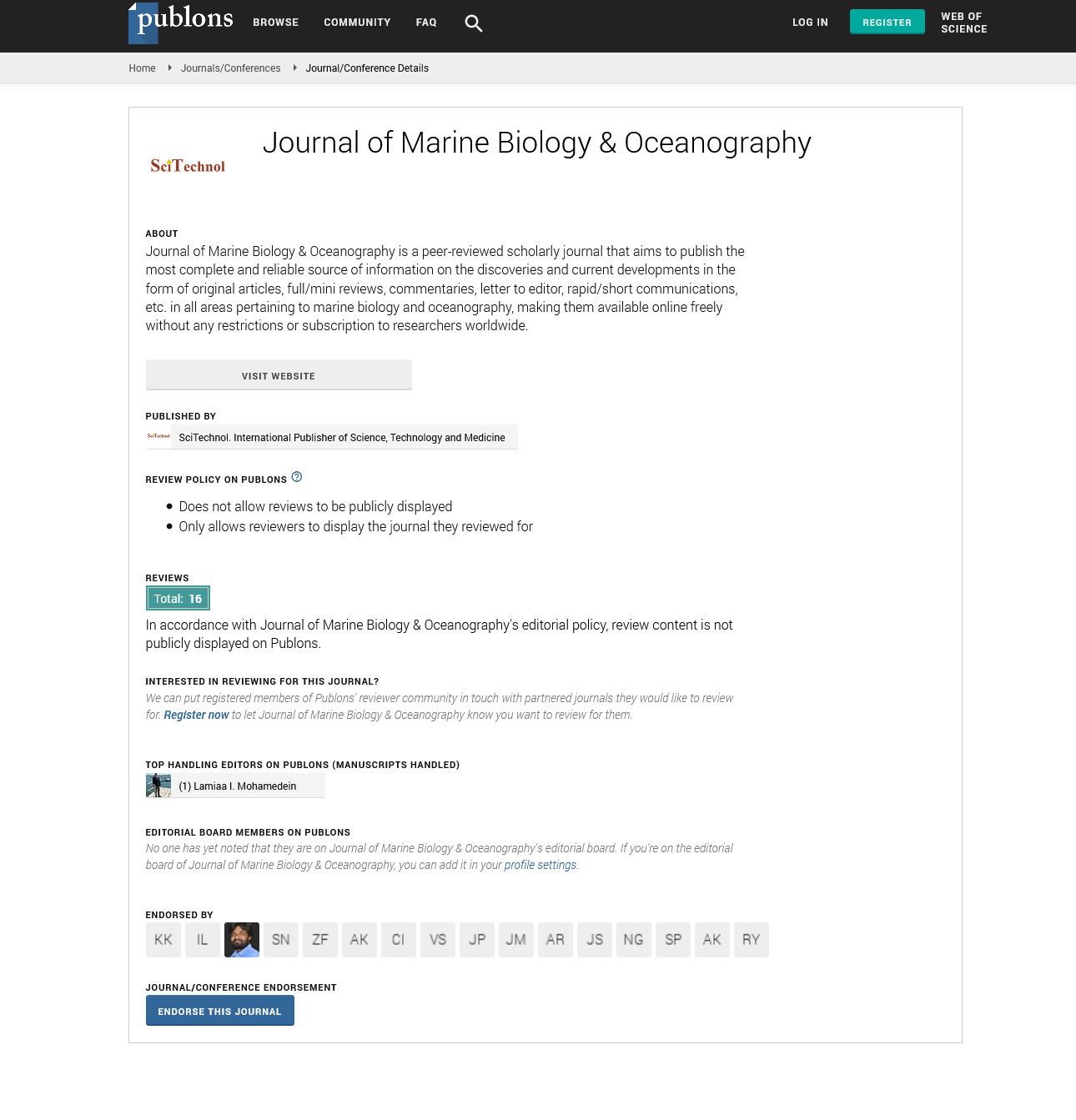Perspective, J Mar Biol Oceanogr Vol: 12 Issue: 4
Examining Marine Zoology: Occurrence, Diversity and Conservation
Juan Paul*
1Department of Natural Resources & the Environment, Atlantic Technical University, Galway city, Ireland
*Corresponding Author: Juan Paul,
Department of Natural Resources & the
Environment, Atlantic Technical University, Galway city, Ireland
E-mail: juan_paul@atu21.ie
Received date: 24 July, 2023, Manuscript No. JMBO-23-113724;
Editor assigned date: 26 July, 2023, PreQC No. JMBO-23-113724 (PQ);
Reviewed date: 10 August, 2023, QC No. JMBO-23-113724;
Revised date: 17 August, 2023, Manuscript No. JMBO-23-113724 (R);
Published date: 24 August, 2023, DOI: 10.4172/2324-8661.1000283.
Citation: Paul J (2023) Examining Marine Zoology: Occurrence, Diversity and Conservation. J Mar Biol Oceanogr 12:4.
Description
Marine zoology, also known as marine biology, is the study of marine organisms, their behaviours, physiology, interactions, and the ecosystems they inhabit in marine environments. This field of biology focuses on the diverse life forms that thrive in oceans, seas, and other saltwater habitats, including coastal areas, deep-sea environments, coral reefs, and estuaries. Marine zoology encompasses a vast range of habitats and environments, each hosting unique assemblages of species.
Coral reefs are among the most biodiverse ecosystems on the planet. These underwater cities are bustling with life, from brilliantly coloured corals to an astonishing variety of fish, molluscs, and crustaceans. The pelagic zone, or open ocean, covers vast stretches of water and is home to an abundance of marine life, including large predators like sharks, billfish, and dolphins, as well as tiny planktonic organisms that form the basis of the marine food web.
Intertidal zones are inhabited by a wide range of creatures adapted to endure the constant changes in water levels and exposure to air. In which crabs, snails, anemones, and many other species are present. The deep sea, with its crushing pressures, frigid temperatures, and complete darkness, is home to a host of bizarre and unique organisms, including anglerfish, giant squid, and deep-sea corals.
Mangrove forests, found along coastlines in tropical and subtropical regions, provide essential nursery grounds for many marine species, including various fish, crustaceans, and molluscs. The polar seas, despite their extreme cold, are inhabited by specialized marine life, such as seals, penguins, and a variety of cold-adapted fish.
Diversity in marine zoology
Marine life is incredibly diverse, with innumerable species representing different phyla, classes, and orders. Marine zoologists study and classify these organisms, revealing their complex adaptations and roles in marine ecosystems. The oceans teem with invertebrates, from the elegant forms of jellyfish and sea anemones to the armoured exoskeletons of crustaceans like crabs and lobsters. Molluscs like squids, octopuses, and snails also thrive in marine environments. The class of fish is remarkably diverse, encompassing everything from the tiny, transparent larvae of reef fish to massive apex predators like sharks and the delicate form of angelfish and butterflyfish.
Marine mammals, including whales, dolphins, seals, and sea lions, have evolved a range of adaptations to live in the ocean. These creatures are celebrated for their intelligence and unique behaviors. Penguins, seagulls, albatrosses, and puffins are just a few examples of marine birds that have adapted to life on the ocean's surface, in the air, or beneath the waves in search of prey. Coral reefs, often referred to as the "Rainforests of the sea," are constructed by tiny coral polyps. These reefs provide essential habitat and support a wealth of marine species.
Despite the incredible richness and complexity of marine life, these ecosystems face numerous threats, many of which are driven by human activities. Overfishing depletes fish stocks, disrupts food chains, and damages marine habitats. Sustainable fishing practices are vital to ensuring the health of marine ecosystems. Coastal development, pollution, and destructive fishing practices harm marine habitats like coral reefs, mangroves, and seagrass beds. Rising ocean temperatures, ocean acidification, and sea-level rise due to climate change are causing widespread impacts on marine life, including coral bleaching and altered migration patterns. Marine environments are increasingly polluted with plastic waste, endangering marine animals that ingest or become entangled in plastic debris.
Invasive species can disrupt native ecosystems and threaten indigenous marine species. Ballast water discharge from ships is a common vector for invasive species. Illegal trade in marine species, such as seahorses, sea turtles, and coral, poses a significant threat to marine biodiversity.
Conclusion
Marine zoology unveils the hidden wonders of the oceans, from the vibrant colours of coral reefs to the deep-sea mysteries of the abyss. As one can gain a deeper understanding of the occurrence and incredible diversity of marine life, one must also recognise the responsibility to protect these fragile ecosystems. Conservation efforts are paramount to safeguarding the future of marine zoology. Sustainable fisheries management, the establishment of marine protected areas, the reduction of plastic pollution, and global action to combat climate change are essential steps in preserving the health and diversity of the oceans. By appreciating the significance of marine zoology and its conservation imperatives, one can work together to ensure that the treasures of the underwater world continue to inspire and educate future generations.
 Spanish
Spanish  Chinese
Chinese  Russian
Russian  German
German  French
French  Japanese
Japanese  Portuguese
Portuguese  Hindi
Hindi 
